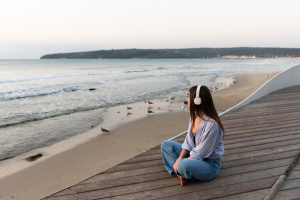The Sacred Passage: A Spiritual Guide to the Journey Within
The Sacred Passage: A Spiritual Guide to the Journey Within
In the hustle and bustle of our daily lives, it's easy to lose sight of the profound journey that exists within ourselves. "The Sacred Passage: A Spiritual Guide to the Journey Within" invites us to embark on a transformative exploration of our inner landscapes, seeking deeper meaning and connection to the spiritual essence that resides within each of us.
Connecting with the Inner Self
The journey within, often referred to as a sacred passage, invites us to embark on a transformative encounter with our innermost selves. In a world filled with external distractions, the act of connecting with the inner self becomes a profound and intentional exploration, akin to embarking on a sacred pilgrimage.
Embracing Silence and Stillness
At the heart of connecting with the inner self lies the practice of embracing silence and stillness. In the quietude of our own minds, we discover a sanctuary where the noise of the external world fades away. Through meditation or moments of contemplative solitude, we create a sacred space to listen to the whispers of our inner wisdom. It is in these moments of stillness that the essence of our true selves begins to reveal itself.
Unveiling Layers of Authenticity
The inner self is often veiled by layers of conditioning, societal expectations, and the roles we play in our daily lives. Connecting with this sacred aspect involves peeling back these layers to reveal the core of authenticity. It requires a willingness to confront and understand the narratives that have shaped us, allowing for a more genuine expression of who we are beneath the surface.
Exploring the Landscape of Emotions
Our inner selves are a rich landscape of emotions, ranging from joy and love to fear and sorrow. Connecting with the inner self entails a courageous exploration of this emotional terrain. It involves acknowledging and embracing the full spectrum of our feelings, understanding their origins, and learning from the wisdom they carry. In doing so, we develop a deeper emotional intelligence that enhances our self-awareness.
The Dance of Introspection
Introspection becomes a dance with the inner self—an art of self-inquiry that goes beyond surface-level observations. Through thoughtful reflection, we gain insights into our values, desires, and fears. It's a dance of self-discovery that allows us to understand the motives behind our actions and the beliefs that shape our perspectives. The sacred passage within is illuminated by the awareness cultivated through this intricate dance of introspection.
Cultivating Compassion for the Self
As we connect with our inner selves, it is essential to approach this journey with compassion. The sacred passage is not about judgment or perfection but about embracing our imperfections with kindness. Self-compassion becomes a guiding light, allowing us to treat ourselves with the same gentleness and understanding that we extend to others. In this compassionate embrace, we find acceptance and healing.
A Continual Unfolding
Connecting with the inner self is not a one-time event but a continual unfolding. It is a dynamic relationship with ourselves that evolves over time. Through each encounter, we deepen our understanding, refine our connection, and witness the ongoing transformation of our inner landscape.
In the sacred encounter of connecting with the inner self, we embark on a journey that transcends the boundaries of time and space. It is a journey of self-love, self-discovery, and self-acceptance—a pilgrimage that leads us to the essence of who we truly are. As we navigate this sacred passage, the inner self becomes not only a destination but a constant companion on the beautiful voyage of life.

A woman making a heart with her hands, embarking on a Sacred Passage within, guided by her Spiritual Guide.
Navigating the Spiritual Landscape
Embarking on the sacred journey within involves navigating a vast and intricate spiritual landscape. It is a profound exploration that requires us to chart a course through the realms of consciousness, mindfulness, and transcendence. As we navigate this spiritual landscape, we discover transformative practices that serve as compass points, guiding us toward deeper self-awareness and connection with the divine.
Mindful Presence as the Compass
At the heart of navigating the spiritual landscape is the practice of mindful presence. Mindfulness becomes the compass that directs our attention to the present moment, where the richness of the spiritual landscape unfolds. Through mindful awareness, we become attuned to the subtle nuances of our thoughts, emotions, and sensations. This heightened awareness serves as a guiding force, leading us to a deeper understanding of the interconnectedness between the self and the universe.
Meditation as the Sacred Pathway
Meditation emerges as a sacred pathway within the spiritual landscape—a transformative practice that invites us to journey inward. Whether through breath awareness, loving-kindness meditation, or transcendental practices, meditation becomes a vehicle for transcending the ordinary and connecting with the extraordinary depths of our being. It is in the stillness of meditation that we encounter the sacred essence that permeates every facet of existence.
Contemplative Practices as Signposts
Contemplative practices act as signposts along the spiritual landscape, offering guidance and reflection. These practices may include journaling, prayer, or engaging in rituals that resonate with our spiritual inclinations. Each contemplative act becomes a way to deepen our connection with the divine, providing moments of introspection and communion with the sacred.
Embracing the Paradoxes
The spiritual landscape is replete with paradoxes—moments of darkness and light, stillness and movement, silence and sound. Navigating this landscape involves embracing these paradoxes with an open heart and mind. It is through the acceptance of the dualities that we find balance and harmony within ourselves. The spiritual journey becomes a dance of opposites, leading to a holistic understanding of the interconnected tapestry of existence.
Sacred Symbols and Archetypes
Symbols and archetypes emerge as landmarks within the spiritual landscape, transcending cultural and religious boundaries. Whether through ancient symbols, mythological archetypes, or personal metaphors, these elements provide a language for expressing the ineffable aspects of the divine. They become waypoints that help us navigate the spiritual terrain, offering insights and revelations along the way.
The Integration of Spirituality into Daily Life
Navigating the spiritual landscape is not confined to moments of formal practice; it extends into the integration of spirituality into daily life. The conscious application of spiritual principles—such as compassion, gratitude, and mindfulness—becomes a bridge between the sacred and the mundane. It is through this integration that the spiritual landscape unfolds in the tapestry of our everyday experiences.
The Pilgrimage of Transformation
In essence, navigating the spiritual landscape is a pilgrimage of transformation—a continuous journey of becoming. It is a sacred odyssey where each step, each practice, and each moment of awareness contributes to the evolution of the soul. As we navigate this landscape, we discover that the sacred is not a distant destination but a living, breathing presence within and around us.
In navigating the spiritual landscape, we become wayfarers of the soul, traversing the depths of our inner realms and connecting with the divine tapestry of existence. The compass of mindfulness, the pathways of meditation, and the landmarks of symbols guide us on this sacred journey, unveiling the boundless potential for spiritual growth and self-discovery.

A woman with her hands on her chest, experiencing a Sacred Passage within herself guided by her Spiritual Guide.
Embracing Transformation
The journey within, often considered a sacred passage, is intricately woven with the threads of transformation. "Embracing Transformation" becomes not just a phase but a continuous dance with change—a profound alchemy of self-discovery and growth. In the tapestry of our lives, transformation becomes the vibrant thread that weaves together the narrative of our evolving selves.
The Dance of Change
Embracing transformation is akin to participating in a dance with the ever-changing rhythms of life. It involves surrendering to the inherent flow of existence, recognizing that change is a constant and inevitable companion on the journey within. Rather than resisting the ebb and flow of life's currents, we learn to move with grace, adapting to the music of transformation that plays in the background of our existence.
Shedding Old Layers
Transformation invites us to shed old layers, much like a caterpillar undergoing metamorphosis to become a butterfly. These layers may include limiting beliefs, outdated perceptions, and attachments that no longer serve our highest good. Embracing transformation requires the courage to let go, allowing the old to fall away and making space for the emergence of a more authentic self.
Discovering Universal Truths
"The Sacred Passage" also encourages exploration of universal truths that transcend individual experiences. Themes such as interconnectedness, compassion, and love are woven into the fabric of this spiritual guide. Recognizing our interconnectedness with the world around us can lead to a profound shift in perspective, fostering a sense of unity and harmony.
The Role of Rituals and Ceremonies
Rituals and ceremonies play a significant role in many spiritual practices. Whether it's a simple daily ritual or a more elaborate ceremony, these acts can serve as powerful tools for grounding ourselves in the present moment and honoring the sacredness of our journey within.
Conclusion
If you are inspired to delve deeper into the transformative journey of self-discovery and spiritual exploration, we invite you to connect with us. Our team is here to guide and support you on your sacred passage. Whether you seek further insights, have questions, or are ready to take the next step on your spiritual journey, feel free to contact us today.
Embark on this sacred journey with the assurance that you are not alone. Contact us today, and let the transformative exploration of "The Sacred Passage" unfold in your life.







